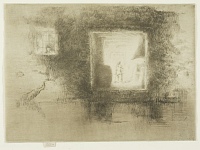Etchings Institutions search term: caxton club
Nocturne: Furnace | ||
| Number: | 208 | |
| Date: | 1879/1880 | |
| Medium: | etching and drypoint | |
| Size: | 171 x 233 mm | |
| Signed: | butterfly at left | |
| Inscribed: | no | |
| Set/Publication: | 'Second Venice Set', 1886 | |
| No. of States: | 12 | |
| Known impressions: | 46 | |
| Catalogues: | K.213; M.210; W.183 | |
| Impressions taken from this plate (46) | ||
PUBLICATION
9: Dowdeswell to Whistler, invoice 16 July 1887, GUW #00891.
EXHIBITIONS
10: London FAS 1883 (cat. no. 44).
11: The World, 22 May 1878.
Furthermore, a brief exhibition of the 'Second Venice Set' at the Hogarth Club in 1887 inspired one art critic to write lyrically:
12: 'Fine Art', Mr Whistler's Exhibition', Bazaar, 28 February 1883 (GUL PC6/43).
13: 'The Whistler Exhibition,' New York Mail and Express, 24 October 1883 (GUL PC3/61).
14: Anon., 'Mr Whistler's Etchings', The Standard, London, 3 March 1887 (GUL PC7/18-19).
An impression of Nocturne: Furnace was exhibited at a show organised by the Caxton Club in Chicago in 1900, lent by Bryan Lathrop (1844-1916) (
 ). 16
James Cox-Cox (ca 1849- d.1901) lent one to the Glasgow International of 1901. 17
). 16
James Cox-Cox (ca 1849- d.1901) lent one to the Glasgow International of 1901. 17
After Whistler's death, impressions were shown in the Whistler Memorial Exhibitions, as many as four different states being shown at the Grolier Club in New York in 1904, one in Boston (lent by Howard Mansfield (1849-1938)) in 1904, and another in London in 1905. 18
15: See REFERENCES: EXHIBITIONS.
16: Chicago 1900 (cat. no. 163).
17: Glasgow 1901 (cat. no. 219 ).
18: New York 1904a (cat. nos. 185a-d); Boston 1904 (cat. no. 144 ); London Mem. 1905 (cat. no. 182).
SALES & COLLECTORS
However, most were sold through Messrs Dowdeswell and Alphonse Wyatt Thibaudeau (ca 1840- d.1892) as part of the 'Second Venice Set'. Dowdeswell's gave one set to the British Museum in 1887 (
 ). Thibaudeau sold one with a set through Gustave Lauser (b. ca 1841) and H. Wunderlich & Co. to Isabella Stewart Gardner (1840-1924) in 1890 (
). Thibaudeau sold one with a set through Gustave Lauser (b. ca 1841) and H. Wunderlich & Co. to Isabella Stewart Gardner (1840-1924) in 1890 ( ). Dowdeswell's sold a seventh state to Henry Studdy Theobald (1847-1934), and this was sold though Colnaghi's and Knoedler's to Margaret Selkirk Watson Parker (1867-1936) (
). Dowdeswell's sold a seventh state to Henry Studdy Theobald (1847-1934), and this was sold though Colnaghi's and Knoedler's to Margaret Selkirk Watson Parker (1867-1936) ( ). Charles Lang Freer (1856-1919) bought a heavily inked impression of the seventh state from F. Keppel & Co. in 1887 (
). Charles Lang Freer (1856-1919) bought a heavily inked impression of the seventh state from F. Keppel & Co. in 1887 ( ); and a third state from Thomas Way (1837-1915) in 1905 (
); and a third state from Thomas Way (1837-1915) in 1905 ( ).
). Whistler sold a few impressions (presumably proofs of different states), including one to the Fine Art Society, London, on 18 April 1893 for £5.5.0. 21 and one to H. Wunderlich and Co., New York, in 1898 for £6.6.0. 22 Finally he sold one on 24 December 1902 to Dunthorne for £12.12.0, reflecting the late and general increase in his prices. 23
 ,
,  ,
,  ,
,  ).
). ); George Aloysius Lucas (1824-1909) (
); George Aloysius Lucas (1824-1909) ( ); Bryan Lathrop (1844-1916) (
); Bryan Lathrop (1844-1916) ( ); John Henry Wrenn (1841-1911) (
); John Henry Wrenn (1841-1911) ( ); Wilson King (b. ca 1847) and his wife (
); Wilson King (b. ca 1847) and his wife ( ); Clarence Buckingham (1855-1913) (
); Clarence Buckingham (1855-1913) ( ); Harry Brisbane Dick (1855-1916) (
); Harry Brisbane Dick (1855-1916) ( ); Herschel V. Jones (1861-1928) (
); Herschel V. Jones (1861-1928) ( ); Albert Henry Wiggin (1868-1951) (
); Albert Henry Wiggin (1868-1951) ( ); Francis Bullard (1862-1913) and Harris G. Whittemore (d. ca 1937) (
); Francis Bullard (1862-1913) and Harris G. Whittemore (d. ca 1937) ( ); Walter Stanton Brewster (1872-1954) (
); Walter Stanton Brewster (1872-1954) ( ,
,  ); R. Woods Bliss (b. 1875) and Emma Regina Martin (1921-2009) (
); R. Woods Bliss (b. 1875) and Emma Regina Martin (1921-2009) ( ). Ernest Stephen Lumsden (1883-1968) acquired the unique proof printed by Salmon, and his wife later sold it to the National Gallery of Scotland (
). Ernest Stephen Lumsden (1883-1968) acquired the unique proof printed by Salmon, and his wife later sold it to the National Gallery of Scotland ( ).
).
